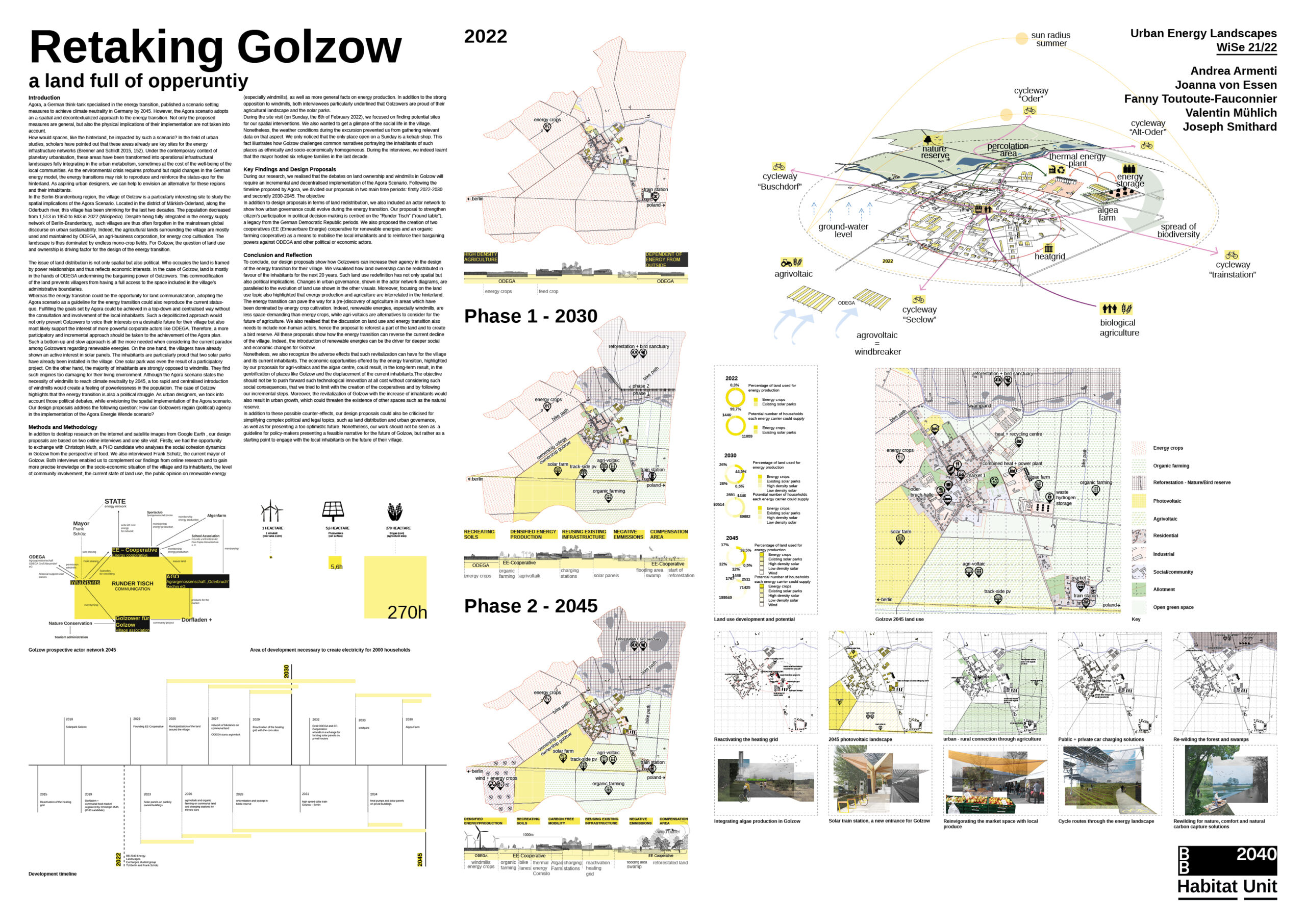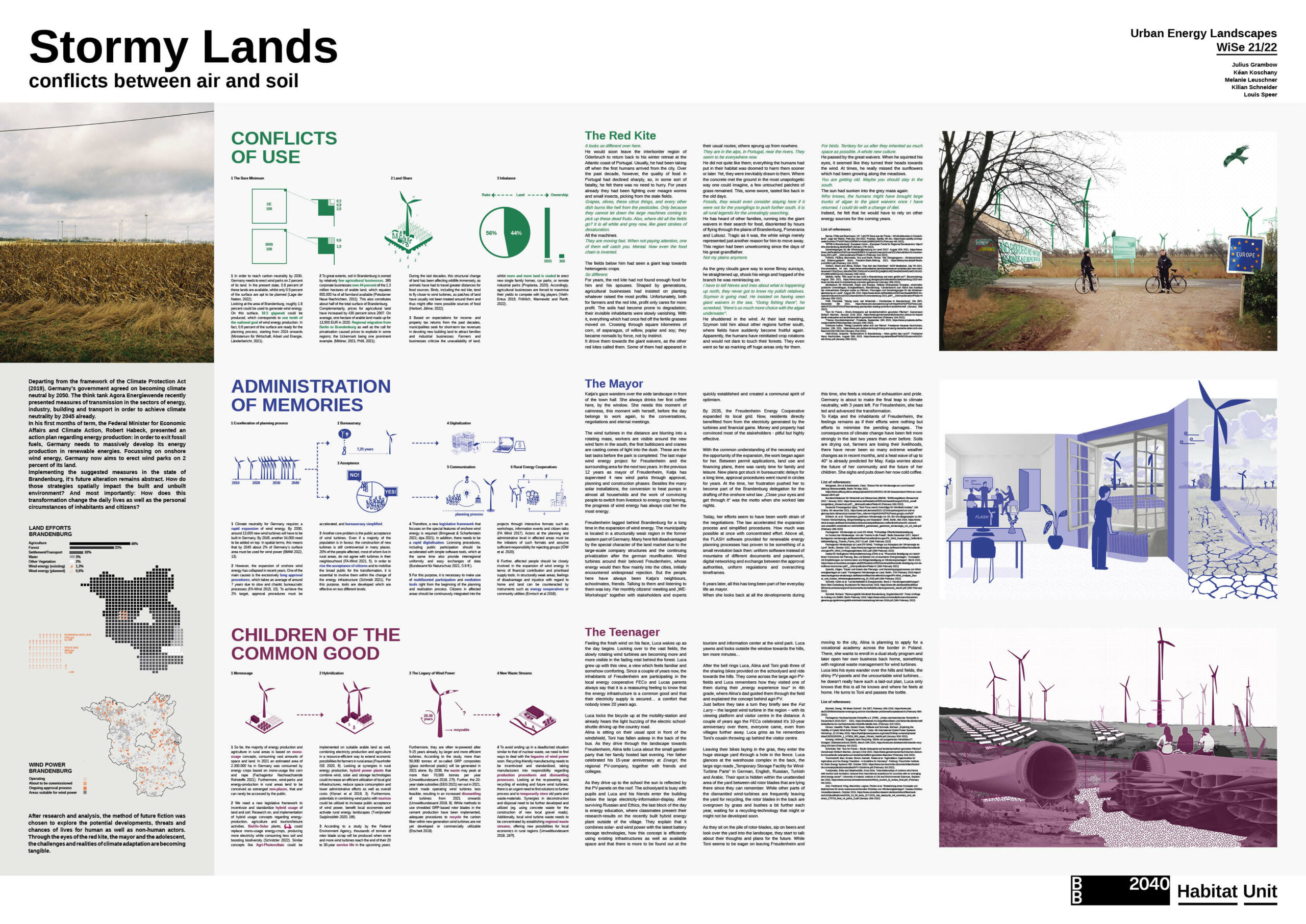Urban Energy Landscapes I Rural Scapes
VILLAGE // INTERMEDIATE
By: Andrea Armenti, Fanny Toutoute-Fauconnier, Joseph Smithard, Joanna von Essen, Valentin Mühlich (Group A)
Julius Grambow, Kéan Koschany, Melanie Leuschner, Kilian Schneider, Louis Speer (Group B)
Studio:
“Urban Energy Landscapes”
Prof. Dr. Elke Beyer
Rosa Pintos Hanhausen
David Bauer
Veit Vogel
Habitat Unit WS 2021/22
Retaking Golzow: a land full of opportunities
Although the hinterland has been neglected in the mainstream discourse on urban sustainability, these areas are in the forefront for achieving climate neutrality by 2045. Under the ongoing process of planetary urbanization, these so-called operational landscapes are key to sustain the urban metabolism and are key to sustain the every-day life of inhabitants (Brenner and Schmid 2015, 152).
Located in the Eastern part of the Brandenburg region, the village of Golzow reflects the land use and ownership struggles faced by the hinterland in the context of the energy transition. This shrinking village is a key production site in the Berlin-Brandenburg energy network. Indeed, the agricultural lands surrounding the village are used and maintained by ODEGA, an agri-business corporation, for energy crop cultivation. Paradoxically, Golzowers are quite proud of their agricultural landscape that they want to preserve against the introduction of windmills.
Political and spatial agency shapes land distribution. Unequal power relationships between the villagers and ODEGA have enabled the commodification of the land around Golzow. Taking an incremental and community-oriented approach, our design proposals seek to challenge the status-quo and to strengthen the agency of Golzowers in the transition towards a more sustainable energy model.
STORMY LANDS - conflicts between air and soil
Departing from the framework of the Climate Protection Act (2019), Germany’s government agreed on becoming climate neutral by 2050. In order to achieve climate neutrality by 2045 already, the think tank Agora Energiewende recently proposed measures of abbreviating the shift towards renewable systems, considering the sectors of energy, industry, building, and transport.
Immediately following his election, the Federal Minister for Economic Affairs and Climate Action, Robert Habeck, presented an action plan regarding energy production. To achieve the status of a post-fossil nation, Germany is required to massively restructure its energy provision. Focussing on onshore wind energy, Germany now aims to erect wind parks on 2 percent of its land.
In the state of Brandenburg, the implementation of the suggested national strategy remains abstract. How would those strategies impact the built and unbuilt environment? How would this transformation change personal trajectories of inhabitants and citizens?
After research and analysis, we have chosen future fiction as a medium to explore potential developments, threats, and chances for both human and non-human actors. The fictional stories of three different characters are told on our poster. Through the eyes of the red kite, the mayor, and the adolescent, different overlapping issues and approaches related to Brandenburg’s current transformation are introduced. The narrative of the Red Kite embodies conflicts of soil from a hon-human perspective. Followingly, the mayor deals with administrative and bureaucratic problems of expanding wind power. Ultimately, the story of an adolescent addresses new normalities of growing up in hybrid landscapes.
Our film is meant to be a prologue to the fictional deepenings of our poster. It is meant to convey some of the impressions which we have been able to gather in Brandenburg. Far away from our computer screens, this is where the present times are ought to be prepared for the carbon-neutral future which the cities have been imagining.
BB2040
[EN] Berlin Brandenburg 2040 was initiated by the Habitat Unit in cooperation with Projekte International and provides an open stage and platform for multiple contributions of departments and students of the Technical University Berlin and beyond. The project is funded by the Robert Bosch Foundation.
[DE] Berlin Brandenburg 2040 wurde initiiert von der Habitat Unit in Kooperation mit Projekte International und bietet eine offene Plattform für Beiträge von Fachgebieten und Studierenden der Technischen Universität Berlin und darüberhinaus. Das Projekt wird von der Robert Bosch Stiftung gefördert.



